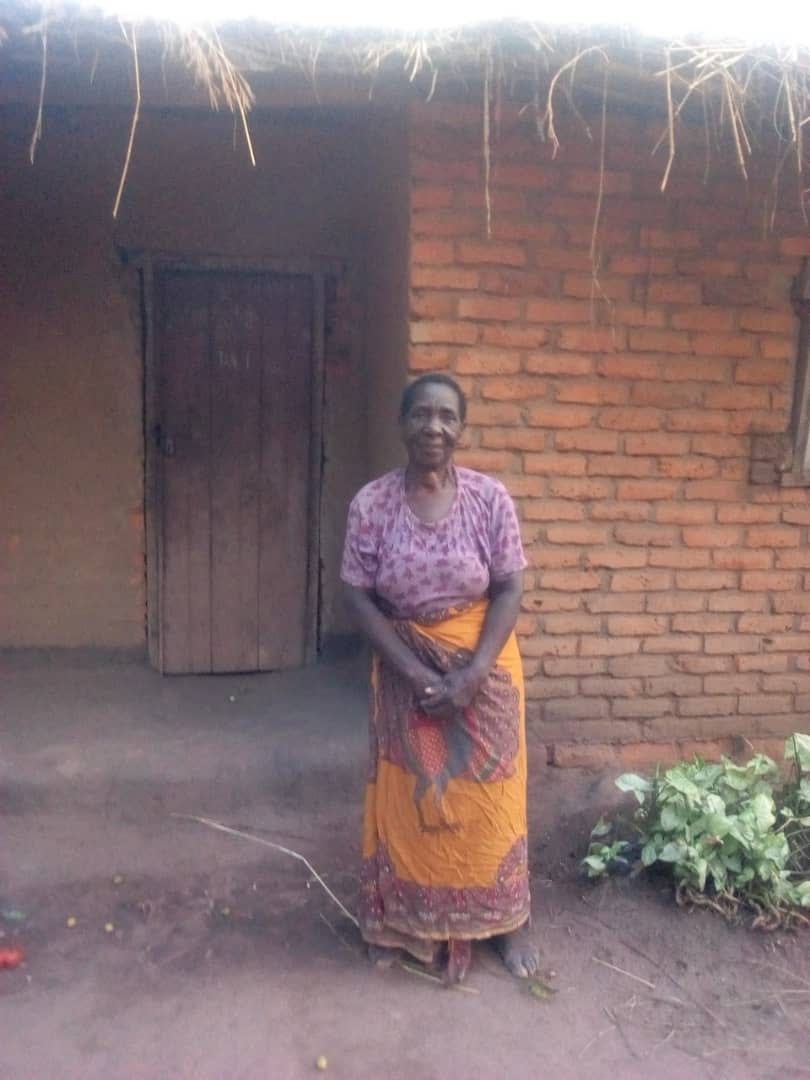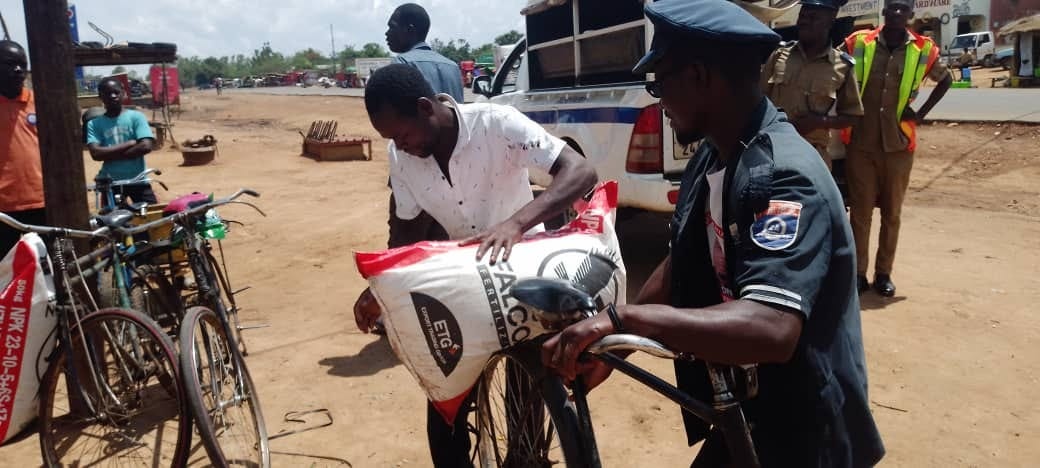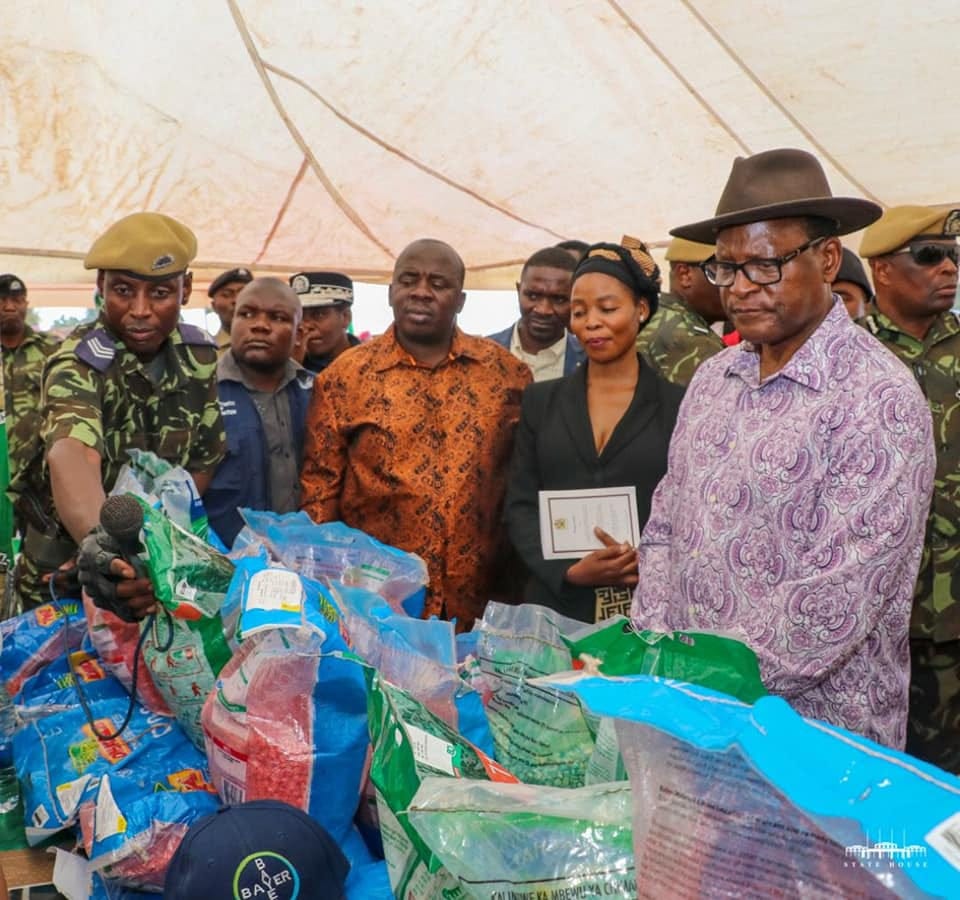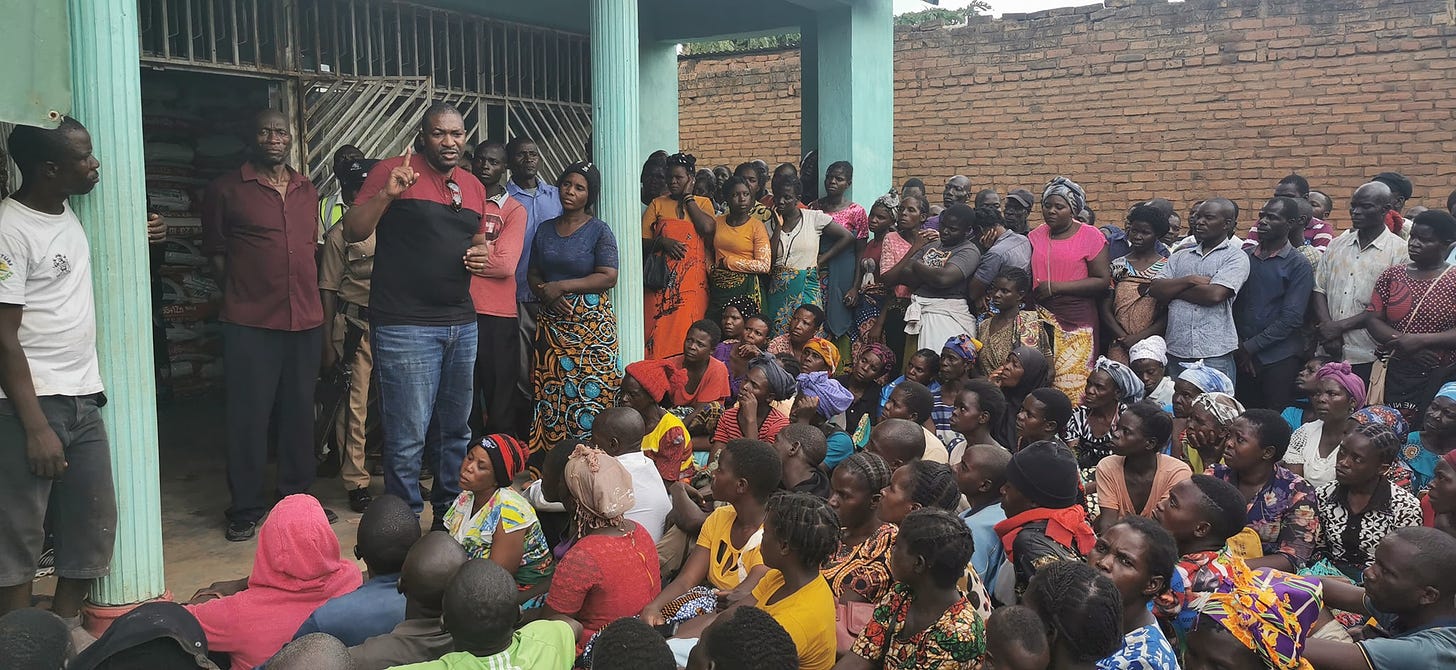How Mchinji-Mikundi EPA Beneficiaries Were Duped... and How They’ve Banded Together to Overcome Teething AIP Challenges
While the 2022-2023 AIP was launched in November, the programmes are expected to face new challenges in addition to those identified by the farmers in Mchinji.
Malawi: A Mchinji community that bore the brunt of the challenges that dogged the Affordable Input Programme in the 2021–2022 farming season has banded together in a rare display of unity to get rid of the teething AIP challenges, write Winston Mwale and Andre Harare.
It's a weekend, and we're in the Traditional Authority M'duwa area of Mchinji district in central Malawi.
We are specifically here to learn more about the Affordable Input Program (AIP), as people in these villages were heavily impacted by the scandals surrounding the programme during the 2021-2022 farming season.
Namagelo Mafiya, who has a family of nine members, says she has no kind words for the scandals that rocked AIP during the 2021-2022 farming season because she literally failed to buy farm inputs despite going to the markets four times.
"Right now, we're surviving on food purchased after doing some piece work. For example, the little maize you see on the bicycle over there was purchased for K5, 000 after doing some piece work," she explained, showing us a bag containing a handful of maize.
According to Mafiya, whenever she went to buy farm input last year, stocks would run out because vendors would buy out everything in collusion with officials.
Last year, farmers benefiting from the AIP, such as Mafiya, paid K7, 500 for a bag of fertiliser; this year, farmers participating in the programme are expected to pay K15, 000.
The AIP Taskforce's Richard Chimwendo Banda stated that the program's budget for this year is K109 billion and that 2.5 million farmers will benefit from AIP this year.
"But, honestly, at K15, 000 per bag, I think I could come up with that much money to buy the fertiliser. I'm not sure what I'll do seriously," Mafiya said, echoing sentiments expressed by a large number of AIP recipients.
Meanwhile, Mafiya has pleaded with the government to ensure that vendors are not found near selling points in order to avoid the situation that occurred last year when farmers were unable to purchase the commodity because the vendors had purchased everything.
Following that, we met Beatrice Mike, who told us that she was unable to obtain the two bags of fertiliser to which she was entitled because all fertiliser meant for poor farmers were sold to vendors as chiefs conspired with vendors to buy fertiliser, and many farmers in the area are struggling to feed their families.
She said: “Last year, I planned to plant maize on a one-acre plot of land, but instead, I harvested less maize than my family of eight requires each year. And right now, I'm doing piece work to buy maize, and the 5-litre pail costs MK450 per kilogramme, which is out of reach for most of us.”
Meanwhile, Beatrice said that the only way to address the issue of vendors purchasing fertiliser intended for poor smallholder farmers is to establish farmers’ clubs.
One other farmer we spoke to was Saulosi Jackson, who said his life status has changed, drastically because of the challenges he faced last year around AIP.
"As the head of the family, I'm forced to bring food to the table every morning by doing piecework to feed a family of nine," he explained.
On his part, Saulosi has asked the office of agriculture in the district to remove chiefs from the Affordable Input Program, claiming that they were unable to purchase fertiliser last season because chiefs were at the forefront of receiving bribes from vendors.
Saulosi stated that he will be unable to buy fertiliser, which is currently priced at MK65, 000 for a 50kg bag.
But why is Saulosi, along with other farmers in the area, calling for chiefs to be kicked out of the AIP?
Last year, an interesting story occurred in the area.
Group village headman Thako, one of the area's chiefs, collected National Identity Cards from his subjects in order to purchase fertiliser on their behalf.
These farmers trusted group village headman Thako, but instead of giving them relief, the village headman took all National Identity cards and scanned them without the farmers' knowledge, and fertiliser was purchased in the names of unsuspecting farmers by some unscrupulous business people who worked with the chief.
We were told that police officers from the Mikundi Police Unit arrested Group Village Headman Thako, but he was later released without the knowledge of the farmers.
Later, the chief fled to Zambia, where he remains to this day, the villagers told us.
But Mchinji Police Station Officer Charles James Mpezeni stated that his office had never received a report on the arrest of Group Village Headman Thako and that he needed to consult the criminal investigation department before commenting (CID).
On the other hand, Mpezeni has assured farmers not to panic, saying that the police are on the lookout for unscrupulous vendors and that Mchinji police, in collaboration with community policing forums, are patrolling all SFRFM centres.
He went on to say that the office has shared the phone numbers of officers in all strategic centres for people to call if they suspect wrongdoing.
Mikundi Extension Planning Area (EPA) 26,045 farmers registered to benefit from the Affordable Input programme in the 2021/2022 season; each farmer had to purchase one bag of 50kgs of Urea and NPK at a cost of MK7, 500 per bag.
But only 19,850 farmers out of a total of 26,045 farmers were able to redeem two bags of one type of fertiliser (Urea), while the remaining 6,225 farmers did not benefit, and as a result, these farmers are struggling to feed their families right now.
Mchinji has seven Extension Planning Areas (EPA), with Mikundi EPA being the worst, with a high percentage of farmers failing to purchase fertiliser.
Mikundi EPA AEDIC, Eliya Clemence, acknowledged that the previous AIP season had a number of challenges.
"Aside from Group Village Headman Thako stealing National Identity Cards, farmers walked long distances, for example, farmers from Mzama area walked a distance of 28 kilometres and they were using a manual system to capture beneficiaries even scanned National IDs and the process fuelled the tendency of stealing farmers ID's," Eliya said.
Senior Group Kalombo, for his part, urged the district's Agriculture office to add more fertiliser selling points this year, reducing congestion and allowing farmers to avoid long walks.
But that's not all: Kalombo RAC Chairperson Daswell Kalolo suggested that the government always consider holding consultation meetings with farmers before implementing the programme, asking farmers about their experiences, which could help the Ministry of Agriculture areas to improve.
Meanwhile, Mchinji Agriculture Office claims that it has ensured that this year's AIP is effective by ensuring that intended farmers benefit from the programme.
According to Stater Magombo, Mchinji Chief Agriculture Office, previously farmers failed to redeem due to network problems, but this season the office is attempting to link network specialists when there are network hiccups.
He did, however, say that the office is aware of what happened at Mikundi EPA, where Group Village Headman Thako collected farmers' National Identity Cards and redeemed fertiliser without their knowledge; to prevent this from happening again, farmers are on clubs this year.
"Unlike in the past, we have embarked on the development of farmer organisations in which all of these farmers are on the clubs; this time, farmers will purchase bags of fertiliser as clubs, and this initiative will eliminate corruption practises," he said.
According to Magombo, Mobile Selling Depots will help farmers redeem fertiliser in difficult-to-reach areas.
While the 2022-2023 AIP was launched in November, the programmes are expected to face new challenges in addition to those identified by the farmers in Mchinji.
President Lazarus Chakwera admitted in a speech in October 2022 that the Ministry of Agriculture, through the Smallholder Farmers Fertilizer Revolving Fund of Malawi (SFFRFM), lost a whopping USD 750,000 to a UK-based company that received the money in two instalments without following proper procedures, including checking the company's capacity to supply required fertiliser.
According to him, investigations have revealed that the UK-based company lacks the capacity to fulfil the contract; as a result, the contract was immediately terminated, and a full repayment of USD 750,000 to Malawi is in the works.
Some believe this will have an impact on the AIP because the government will not have enough fertiliser for the programme.
According to a statement made in Parliament by Agriculture Minister Sam Kawale in November, the Malawi government has received 50,144 metric tonnes of fertiliser from donors, which equates to 1,002,880 bags of fertilizer.
Kawale visited Dowa Boma, Mponela, Ntchisi Boma, Malomo, Kasungu Boma, Chinkhoma, Santhe, Kamwendo, Mchinji Boma, and Mkanda beginning on December 3, 2022, to appreciate the ongoing AIP exercise.
He mentioned, among other things, that most of the centres only have NPK fertiliser, while others have both NPK and urea, and that more fertiliser was on its way or was being offloaded, with the remaining centres receiving it this week.
Kawale stated: "Most places have an efficient fertiliser distribution system. Each day is assigned to a village so that people can shop on the designated day. This system assists people, particularly women, in avoiding spending the night at a selling point."
He said that other locations, such as Mponela, Kasungu, Kamwendo, and Mkanda, had longer lines because people disregarded the advice to come on specific days.
"This problem has been resolved, and things will be better this week," he said.
The topic of vendors came up again during his trip.
“Vendors are still out there, trying to take advantage of the situation.” Said Kawale.
The minister also said some community leaders are pressuring villagers to give them a portion of their fertiliser and threatening them with repercussions if they do not.
“This is not acceptable,” he said.
The most serious issue noted during the minister’s trip was Network which slowed down the redemption process.
The minister stated that in the future, they will increase the number of vehicles used to deliver fertiliser throughout the country.
"This will aid in the distribution of fertiliser to all SFFRFM and ADMARC depots, as well as mobile vending. We've hired more clerks to help speed up redemption across the country. They will be sent out this week,” he said.
Given that the government requires five million bags of fertiliser, and that 2.5 million farmers will receive two bags each, the government will have to purchase 3,997,120 bags of fertiliser, with the remainder coming from donors.
As a result, if the 2022-2023 AIP is to be successful, the government must address not only the initial problem of fertiliser scarcity but also the grievances raised by farmers, including those in Mchinji district.
Farmers like Mafiya, Jackson, and Beatrice of Mchinji will tell us whether or not these challenges will be addressed when we visit them in 2023, shortly after harvesting.
For the time being, fingers are crossed that the 2022-2023 AIP will be a success.
Otherwise, as President Chakwera stated in a statement on October 25, 2022, the programme required urgent radical reforms "to improve its efficiency and protect it from careless acts of negligence, corruption, incompetence, and wastage."
*This story was done with support from ActionAid Malawi’s Strengthening Social Accountability Project








Thanks for the article Mr Mwale and Mr Harare. Indeed the programme requires some reforms to improve its efficiency, otherwise beneficiaries are finding it hard to access the fertilizer.